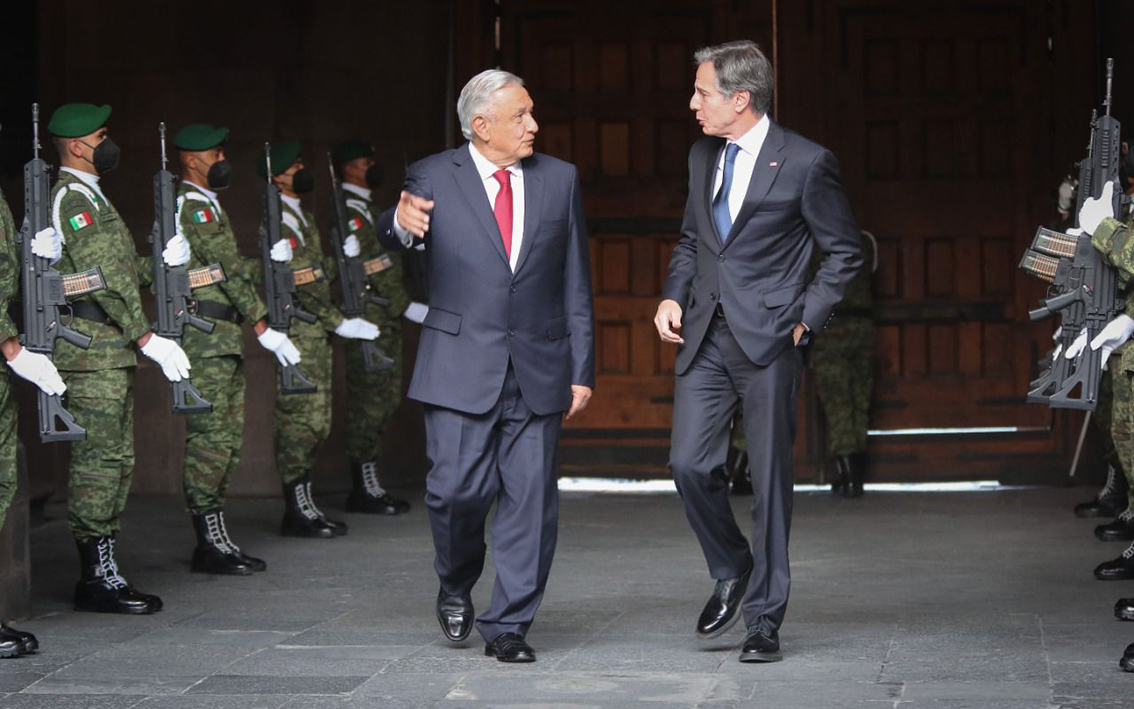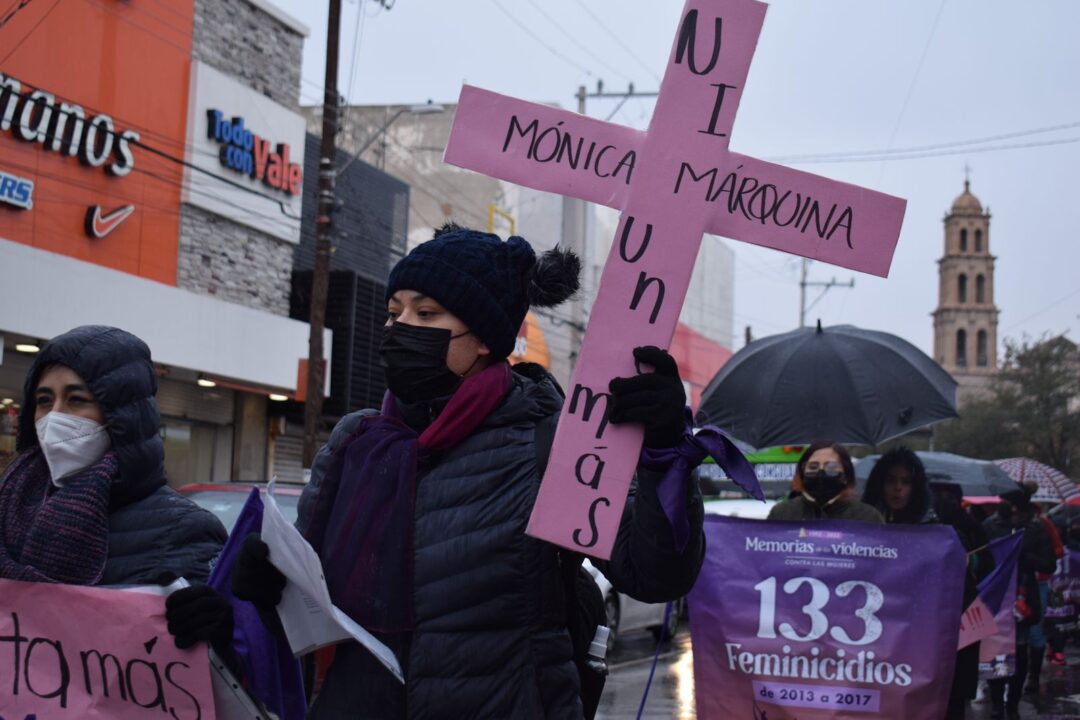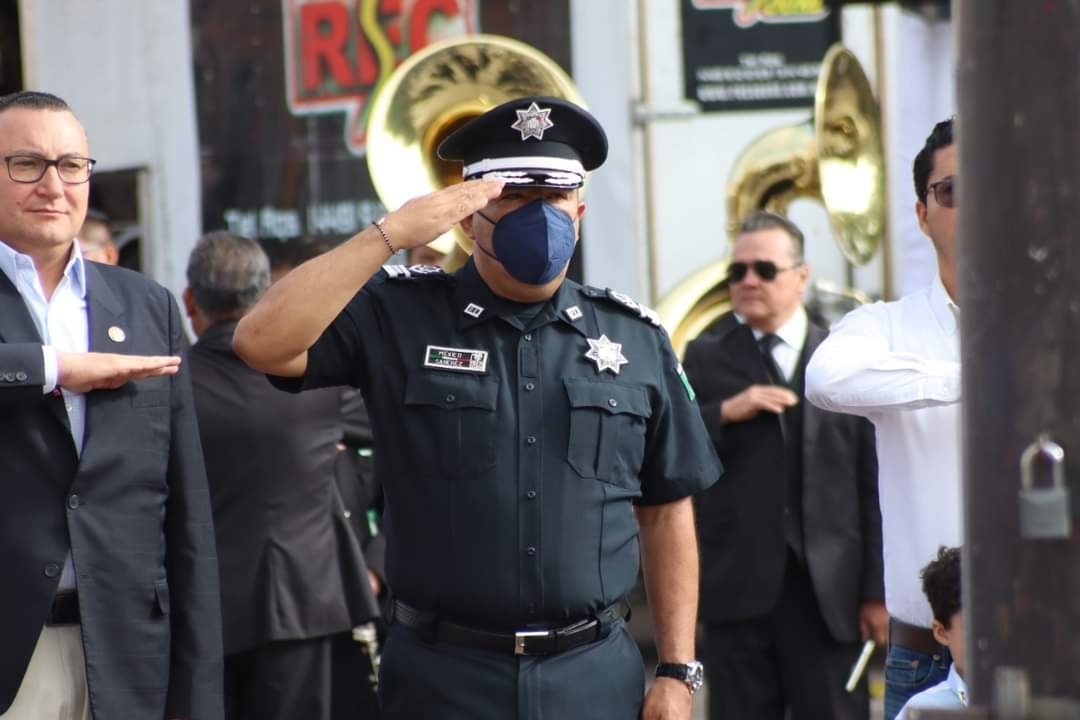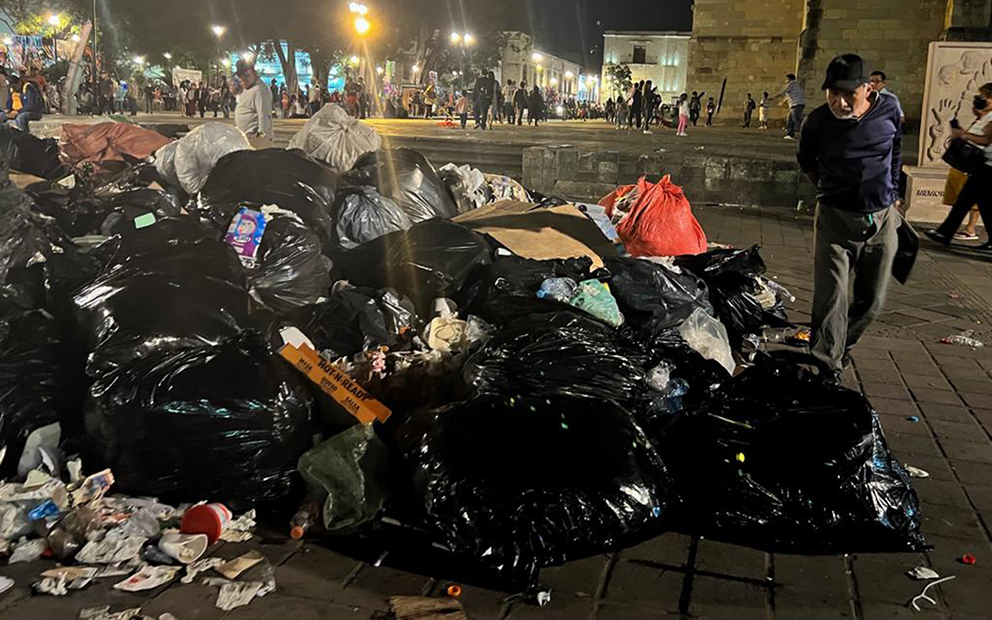The US and Mexico will negotiate a new deal which reforms the previous agreement in order to stop the violence related to drug trafficking. As part of the new agreement, both countries say they will also fight irregular migration and drug consumption.
Text by Itzel Ramírez, originally published by La Verdad de Juárez on October 9, 2021.
Translation by Pie de Página in English.
After 14 years and over three billion dollars, Mexico and the US have ended the Merida Initiative, creating a new joint plan to deal with insecurity and drug trafficking in both countries.
After a meeting between officials from the High Level Security Dialogue from both countries, Mexico’s Foreign Secretary Marcelo Ebrard and US Secretary of State Anthony Blinken, announced the end of the Merida Initiative, and the birth of the «US-Mexico Bicentennial Framework for Security, Public Health and Safe Communities,» which proposes to approach the issues of security, drug use, and illegal trafficking in people and guns across borders from a new perspective.
“The first substantial difference would be that the Merida Initiative was based, from the Mexican perspective, on the fact that we had to capture drug lords and with that it would be enough. That was the essence of it saying, ‘Please, the United States, send helicopters, send equipment. Please, provide assistance so that I can detain these drug lords and solve these issues.’ In essence, that’s what Mexico thought at that time,” said Ebrard, of the now officially terminated agreement.
Now, he said, the Bicentennial Framework (so named to commemorate 200 years of relations between Mexico and the United States) proposes an alliance that will seek a holistic approach to bilateral cooperation.
“…It marks the beginning of a new chapter in Mexico-U.S. security cooperation, one that will see us working as equal partners in defining and tackling shared priorities…” said Secretary Blinken.
The change marks the implicit acceptance of the failure of the Merida Initiative, which has been criticized for inefficiency and in the US’s most December 2020 Western Hemisphere Drug Policy Commission Report.
A series of concrete actions are proposed to reform the kind of collaboration, and –they say– stop the violence related to drug trafficking. The agreement will also extend to irregular migration, drug consumption and other illicit activities.
“The success of this agreement is not going to be measured by how many drug lords we put in jail and how many press conferences we hold. It will be seen through the reduction of the homicide rates in Mexico and the reduction of drug consumption. And there is also reciprocity and co-responsibility, so it’s more egalitarian, it’s more balanced,” said Ebrard.
A focus on weapons trafficking
Arrests followed by press conferences were the preferred method of Genaro García Luna, the ex-secretary of Public Security during Felipe Calderón’s government who is currently imprisoned in the US on drug trafficking charges.
In the new collaborative process, both countries agreed to sign four agreements. The first is a Memorandum of Understanding to “reduce drug addiction and associated harms, with the goal of developing plans to prevent drug consumption,” which includes the creation of a Homicide Prevention Network.
“To prevent transborder crime, Mexico intends to work with the United Nations Office on Drugs and Crime (UNODC) to sign a Memorandum of Understanding on the launch of the UNODC Port Container Control Program in order to strengthen control and management of incoming shipments for precursor chemicals,” reads the Joint Statement from the U.S.-Mexico High-Level Security Dialogue published October 8th after the bilateral meeting.
One of the most important aspects of this for Mexico, as President Andrés Manuel López Obrador and Foreign Secretary Ebrard had announced in the previous weeks, is the agreement to end arms trafficking, especially after the criticism of the “Fast and Furious” gunwalking scandal.
As part of the Merida Initiative, “Fast and Furious” allowed the illegal entry of 2,000 guns to Mexico so that they could be traced and located, with knowledge of the Mexican and US governments. In 2010, “Fast and Furious” was cancelled after the guns were traced to a firefight in which a US agent was killed.
“As two nations with an enduring partnership based on sovereignty, mutual respect, and the extraordinary bond of family and friendship, the United States and Mexico need and want to face security challenges together. Both countries have suffered the effects on our communities of substance addiction, gun violence, illicit drug, arms, and human trafficking, human smuggling, and organized crime. To confront the complex threats of the 21st century, we need to work in a coordinated manner, with a regional vision, and a modern approach of public health and development as part of a holistic cooperation strategy between our countries,” reads the declaration.
Reducing violence in Mexico requires reducing the number of weapons in Mexico, said Ebrard.
One of the new aspects of cooperation is a promise to strengthen forensic work “to help solve the thousands of cases of disappearance in Mexico” by strengthening the technical capacity of the National Search Commission.
Special attention was put on the importation of chemical precursors used in the production of synthetic drugs like fentanyl and methamphetamine.
“We want to avoid the proliferation and consumption of cheaper drugs that is on the rise in both our nations,” said Ebrard.
According to the announcement, there will be a new emphasis on weakening the cartels’ finances. In addition, a bi-national cybersecurity commission will be created.
“We know that it’s not going to be enough to just detain or capture some drug lords. We have to be concerned with addiction, with providing youth with employment opportunities, because if not they resort to crime activities,” said Ebrard.
According to the announcement, the agreement will include deadlines for evaluating the actions taken. According to Ebrard, on December 1st of this year, an annual plan will be presented.
President López Obrador attended a private breakfast before the work meeting. He said before the US committee that the phrase “Poor Mexico, so far from God and so close to the United States” has changed to “Blessed Mexico, so close to God and not so far from the United States.”
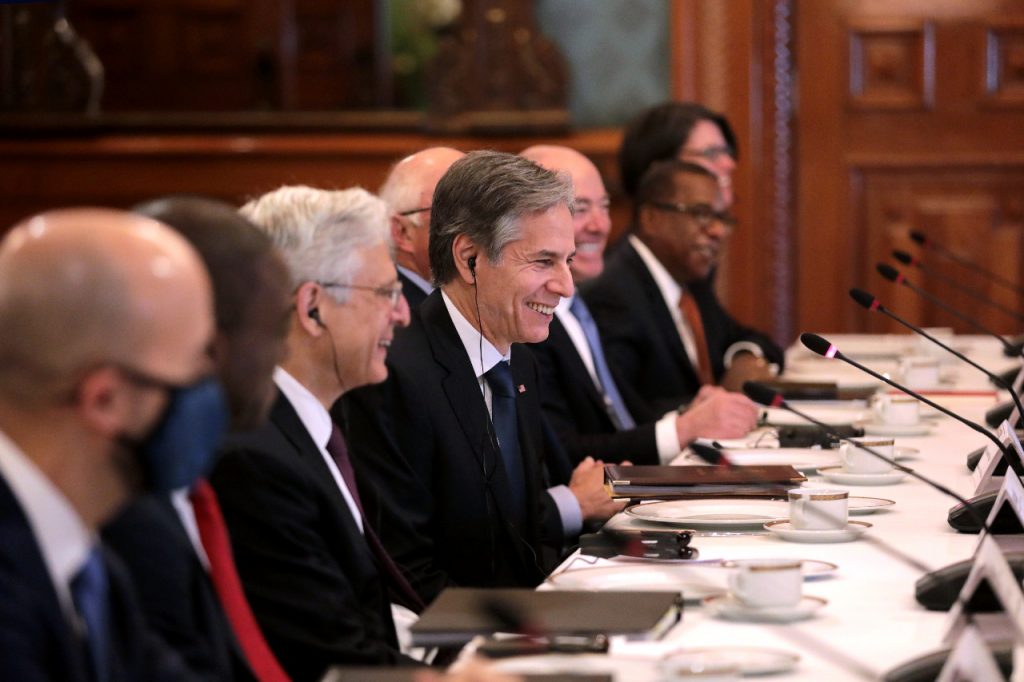
On the Mexican side, in addition to Ebrard were the Secretary of the Interior Adán Augusto López Hernández; National Defense, Luis Cresencio Sandoval González; the Marines, José Rafael Ojeda Durán; Citizen Security and Protection, Rosa Icela Rodríguez Velázquez, Taxation and Public Credit, Rogelio Ramírez de la O; as well as the Mexican ambassador in the US, Esteban Moctezuma Barragán and the head of National Migration Institute (INM), Francisco Garduño Yáñez, and the North America representative of the Foreign Secretary, Roberto Velasco Álvarez.
On the US side was AG Merrick Garland, Homeland Security head Alejandro Mayorkas, Deputy Assistant Attorney General Bruce Swartz; Deputy assistant Treasury Secretary, Wally Adeyemo; Assistant Secretary of State for Western Hemisphere Affairs, Brian A. Nichols; Deputy Assistant Secretary of State for Western Hemisphere Affairs, Juan Sebastián González; the Assistant Secretary for International Affairs at the Department of Homeland Security, Serena Hoy and the note taker from the US Embassy in Mexico, Brian Naranjo.
From failure to redesign
The Merida Initiative didn’t meet its objectives of protecting the US from drug trafficking, or protecting Mexico from criminal violence, according to the Western Hemisphere Drug Policy Commission Report, published on December 1, 2020.
The report stated that a redesign of the Merida Initiative is necessary to allow for significant steps forward on shared objectives, and clear evaluations that show the improvements of the most important cooperation agreement between the two countries.
The Merida Initiative, which began in 2007, saw the US spend approximately $3 billion on equipment, training, strategic development, border security and judicial reform, according to the report.
But the results didn’t flow the way the money did: in 2006 there were for major criminal groups controlling drug trafficking, now there are between six and nine and another 28 localized groups.
“Some estimates believe the number of independent or semi-independent criminal cells is higher: one investigation found 463 of these groups operating in Mexico between 2009 and 2019,” according to the report.
The resources earmarked each year by the US Congress for Mexico (which totalled around $3 billion dollars) didn’t reduce the operational capacity of the cartels.
By way of example, the diversification of criminal activities inside drug trafficking groups, like the battle between the Nueva Generación Cartel Jalisco (CJNG) and the Santa Rosa de Lima Cartel for the control of stolen fuel, or the proliferation of clandestine laboratories dedicated to producing fentanyl, which present an opportunity for smaller criminal groups.
Another failure of the Merida Initiative, according to the document, was the increasing flow of high calibre weapons from the US to Mexico. Between 2001 and 2016, 70 percent of the 106,000 guns recovered and traced by the Mexican government were purchased in the US.
In addition to its inefficiency in combating violence, the Merida Initiative wasn’t efficiently evaluated, according to the report. To date, the impacts of US training and technical assistance are unknown.
Just a few days before Mexico hardened its legislation limiting the work of foreign agents inside its borders, the report noted that the detention of the ex-Defense Secretary of Mexico Salvador Cienfuegos in the US had hurt the relationship between both countries.
«Although the Justice Department dropped the charges in November, saying it would turn evidence over to Mexican authorities, the incident could threaten future collaboration… Mexico’s foreign minister protested the United States’ failure to inform the Mexican government about its investigation,” it reads.
The report pointed to the “remarkable” level of collaboration between the two governments, taking into account Mexico’s sensitivity to foreign interference.
Once the reform to Mexico’s Security Law entered into force, foreign agents had to be accredited by the Foreign Relations Secretary (SRE), which consults with the Army, the Navy, and the Secretary of Citizen Protection and Security in order to authorize the presence and work of agencies like the DEA.
The reform, which emerged from a presidential initiative, also specifies which Mexican bureaucrats have to clear it with the National Security Council before speaking with any foreign agent, and which SRE representatives must attend certain meetings.
In addition to the failures detected, one of the most questionable consequences of security operations in Mexico has to do with the violence that follows every detention or dismantling of leaders of cartels and their networks, according to the report.
“A study of Mexican homicides at the municipal level from 2001 through 2010 found that the capture of a leading trafficker increased local killings by 80 percent and that the effect persisted for at least a year,” reads the report.
In addition, the transition to the US justice system doesn’t have in and of itself the capacity to dismantle the cartels that can penetrate and corrupt all levels of the Mexican government.
There were multiple cases in which high level officials and even participants in DEA programs received hundreds of thousands of dollars as bribes from Mexican cartels, which compromises intelligence programs and makes evident the difficulties of advancing in a program to combat corruption, according to the document, which was directed at the US congress and the White House.

Merida Initiative money
According to the report, most of the initial resources of the Merida Initiative ($1.5 billion) were directed to security forces, including $421 million for the purchase of equipment, including airplanes and helicopters.
From 2014 to 2018, more than 80 per cent of the funds were earmarked for the strengthening of the Rule of Law, respect for human rights and anti-narcotics efforts, including 400 projects by the Bureau of International Narcotics and Law Enforcement Affairs, designed to give technical assistance or training to Mexican officials on issues of the justice system, border and military security, and equipment for forensic laboratories, drug detection and border surveillance.
Another $126 million were awarded to USAID to work with the private sector and civil society.
The Commission noted that Donald Trump reoriented US economic assistance to prioritize combating crime and bolstering border security.
The proposal for 2021, according to the document, sought $68.3 million for the Merida Initiative, which represents 60 per cent less than the $94.2 million Mexico received the prior fiscal year.
A multi-term initiative
The Merida Initiative has existed since the administration of Felipe Calderón, and saw the extradition of criminal leaders as one of the most important steps forward.
During the period of 1994-2000, when Ernesto Zedillo was president, Mexico extradited only 68 suspects, during Calderón’s term that number grew to 587, and there were 394 extraditions as the policy of facilitating prisoners to US custody continued during Enrique Peña Nieto’s term.
The Commission reported that policies during Calderón’s term, like the strengthening and certification of the Federal Police, while ambitious, were poorly executed.
During Peña Nieto’s term, it reads, the policies remained about the same, and security reforms, like the creation of a Gendarmerie, failed to create change.
“…the EPN government, like its predecessor, relied heavily on the military, deploying troops in 27 of Mexico’s 32 federal entities and passing a 2017 Internal Security Law that gave the military greater authority to control civilian protests, gather intelligence, and investigate crimes,”
The reform of ex-president Peña was invalidated by the Supreme Court of Justice.
Security policy during López Obrador’s term has been much more similar to the US than what is suggested by his rhetoric, according to the report.
“Though [López Obrador] criticized the Mérida Initiative during the campaign, he has continued joint law enforcement and training programs,” according to the report.
The president created the National Guard, a new security force made up mostly of soldiers that replaced the Federal Police without US support, scrambling of links with US intelligence and security agencies.
What’s next?
In the context of a change of government in the US and with bilateral politics in a complicated place following the detention of Cienfuegos, the report noted that the Merida Initiative was in a difficult moment.
First off, it’s necessary to audit all of the money invested in security in Mexico. Even though there is a lot of violence in Mexico, the governments of Mexico spend less than one per cent of Gross Domestic Product on security. On average, countries that are part of the Organization for Cooperation and Economic Development spend three percent, according to the report.
Meanwhile, the certification and accreditation of Mexican police haven’t moved forward as planned, and there are backlogs in physical evaluation and exams, competence tests, and basic training.
When the Merida Initiative was launched in 2007, according to the document, both countries agreed to work together “to break the power and impunity of drug and criminal organizations that threaten the health and public safety of their citizens and the stability and security of the region.”
Today, the Merida Initiative has finally been thrown out, in favor of a new agreement with which it shares nearly every objective that wasn’t met over the last decade.
This report was originally Published in La Verdad, Periodismo de Investigación, which is part of the Media Alliance organized by Red de Periodistas de a Pie. You can read the original here.
Ayúdanos a sostener un periodismo ético y responsable, que sirva para construir mejores sociedades. Patrocina una historia y forma parte de nuestra comunidad.
Dona

